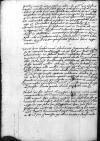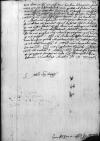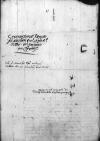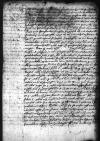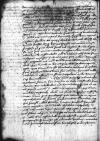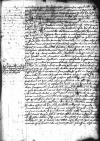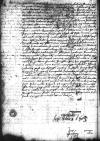1531-10-02⌊Secunda die huius mensis1531-10-02⌋ ⌊⌋ Maiestati Vestrae Serenissimae cum cubiculario ⌊Christofero Gersdorff⌋ longo volumine, quae tunc agebantur. Quem cum iam pridem ad Serenissimam Maiestatem Vestram rediisse arbitror, supervacaneum censui ea, quae tum scripsi, repetere. Interea se nihil obtulit aliud, quam id, quod prius scripsi, Spirensem videlicet conventum exspirasse et alium institutum in Ratisbona pro festo Epiphaniarum futuro, de quo plerique adhuc dubitant, si umquam est successurus.
Litteras Serenissimae Maiestatis Vestrae ad serenissimum Romanorum regem superinscribed⌈regemregem superinscribed⌉ Spiram ad eius maiestatem misi, quae mihi respondit, ut in exemplo his incluso habetur.
Rex Daniae extorris 16 huius cum peditibus suis exivit versus Amsterdamum, Hollandiae oppidum, versus Medenbliz portum, ubi 12 bene instructas naves cum commeatu, bombardis, pulveribus et aliis rebus classem spectantibus provisas est ascensurus. Quod mihi hodie scripsit gubernator Frisiae dominus Georgius Schenk, qui cum rege ibidem egit nomine caesaris, ne graviora damna miseris Hollandis inferret, qui ei coacti fuerunt solvere 5000 florenorum
 BNW, BOZ, 2053, TG 13, No. 1516, f. 70v
praeter naves, commeatum et alia. Et cum his diebus ventum meridionalem satis pro se habuerit validum, creditur, quod ante tres aut quattuor dies iam abierit seque Neptuno et fortunae commiserit. Compertum hic habemus, quod in Dania parati sunt etiam cum non contemnendis copiis, ut adventui illius resistant. In his apparatibus dicuntur esse et civitates Stagnales et Vandalae. Quod si in Daniam traiicere non potuerit vel in Sueciam, ubi etiam indigenae contra illum feruntur instructi, cogetur vel redire in Hollandiam aut prorsus se conferre in Norvegiam, ubi non poterit nisi in summa rerum inopia hibernare. Quid ex ea profectione futurum, brevi experiemur.
BNW, BOZ, 2053, TG 13, No. 1516, f. 70v
praeter naves, commeatum et alia. Et cum his diebus ventum meridionalem satis pro se habuerit validum, creditur, quod ante tres aut quattuor dies iam abierit seque Neptuno et fortunae commiserit. Compertum hic habemus, quod in Dania parati sunt etiam cum non contemnendis copiis, ut adventui illius resistant. In his apparatibus dicuntur esse et civitates Stagnales et Vandalae. Quod si in Daniam traiicere non potuerit vel in Sueciam, ubi etiam indigenae contra illum feruntur instructi, cogetur vel redire in Hollandiam aut prorsus se conferre in Norvegiam, ubi non poterit nisi in summa rerum inopia hibernare. Quid ex ea profectione futurum, brevi experiemur.
Venit huc hodie novum, Helvetios superiore die inter sese acerrime conflixisse et ab his, qui fidem Christi, caerimonias et sanctorum patrum instituta servant et tuentur, superatos esse magna clade Zwinglianos illos, sacramenti Eucharistiae contemptores; ex illisque cecidisse tredecim milia et nostrae religionis sectatorum non fuisse supra octo milia; venisse postea Zwinglianorum decem milia, qui, audita clade suorum, cum nostris congredi non fuisse ausos, priore victoria animatis. Et cum iam inter se sic certare coeperint, actum est de eorum viribus, facile a vicinis principibus redigentur in ordinem. Zwinglium ipsum ferunt vivum in mille partes fuisse discerptum.
cf. V. Max. 1. 1 lento enim gradu ad vindictam sui divina procedit ira tarditatemque supplicii gravitate pensat. ⌊Lento gradu divina procedit iracf. V. Max. 1. 1 lento enim gradu ad vindictam sui divina procedit ira tarditatemque supplicii gravitate pensat. ⌋ etc.
Nihil hic fit aliud; convivatur, pecuniae miris modis conquiruntur; de Turcis nihil curatur, quisque rem suam curat.Ego interim misere ⌊hic⌋ absumor et quod maiorem mihi infert dolorem, alii oratores accipiunt successores, ego solus hic sum perpetuus. Has secum fert in postis ista nocte dominus ⌊comes Nogarollis⌋, qui hic egit nomine serenissimi ⌊Romanorum regis⌋: revocatus clementissime a domino suo; successit etiam alius oratori Anglo ante  BNW, BOZ, 2053, TG 13, No. 1516, f. 71r tres dies et illum, qui supra annum hic fuit, liberavit. Quis vero me sit liberaturus, aut quando id futurum est, avidissime exspecto, diutius enim, ut scripsi in novissimis, nequaquam hic possum subsistere. Rogo igitur per immortalem Deum, quod iam nequiquam rogavi toties, ut me tandem Serenissima Maiestas Vestra clementer redire permittat et me sic funditus non perdat apud exteros, sed si deliqui, quod me conscio factum non est, domi me castiget et ibidem, quicquid voluerit, de me superinscribed⌈meme superinscribed⌉ statuat secundum merita mea, et ne me questus mei ulterius proripiant. Cum non sit, quod ad praesens Serenissimae Maiestati Vestrae scribendum esset reliquum nec tempus quidem id pateretur, his non adeo prolixis, ut erant novissimae, Serenissima Maiestas Vestra clementer dabit veniam, cui me suppliciter commendo. Christus dominus noster eandem Serenissimam Maiestatem Vestram quam diutissime sospitet et prosperet semper in omnibus.
BNW, BOZ, 2053, TG 13, No. 1516, f. 71r tres dies et illum, qui supra annum hic fuit, liberavit. Quis vero me sit liberaturus, aut quando id futurum est, avidissime exspecto, diutius enim, ut scripsi in novissimis, nequaquam hic possum subsistere. Rogo igitur per immortalem Deum, quod iam nequiquam rogavi toties, ut me tandem Serenissima Maiestas Vestra clementer redire permittat et me sic funditus non perdat apud exteros, sed si deliqui, quod me conscio factum non est, domi me castiget et ibidem, quicquid voluerit, de me superinscribed⌈meme superinscribed⌉ statuat secundum merita mea, et ne me questus mei ulterius proripiant. Cum non sit, quod ad praesens Serenissimae Maiestati Vestrae scribendum esset reliquum nec tempus quidem id pateretur, his non adeo prolixis, ut erant novissimae, Serenissima Maiestas Vestra clementer dabit veniam, cui me suppliciter commendo. Christus dominus noster eandem Serenissimam Maiestatem Vestram quam diutissime sospitet et prosperet semper in omnibus.
 BNW, BOZ, 2053, TG 13, No. 3411, f. 44r
Postquam convenissem cum illustrissimo domino ⌊Frederico comite palatino Rheni⌋ et nihil inter nos aliud, quam de mutuis oblationibus collocuti fuissemus, misit ad me postero die mane intimum suum consiliarium doctorem Hermannum, virum doctum et industrium. Is cum more Germanico nomine ⌊domini⌋ sui me salutasset, petiit seorsum a me colloquium, in quo mihi exposuit in primis, quanta benevolentia dominus suus iam a multis annis me prosecutus fuisset et quantam de me iam pridem fiduciam concepisset. Qua de re me nihil celare vellet horum, quod apud se haberet secretissimum, et mihi bona fide concredere omnia, praesertim cum et ex meis litteris et ex me coram non vulgarem meam erga se propensionem liquido agnovisset remque eam esse serenissimum ⌊Romanorum regem⌋, ut aliqua in re propter tot bene merita domini sui gratitudinem suam erga illum ostenderet, superioribus diebus ipsum dominum suum hortatum fuisse, ut iam tandem ad honorificum quoddam matrimonium animum suum inflecteret, quod se illi procurare pollicitus fuisset, proposuisseque hoc cum illustrissima domina on the margin⌈dominadomina on the margin⌉ ⌊principe Hedvige⌋, filia Serenissimae Maiestatis Vestrae. Et quod igitur serenissimus ⌊Romanorum rex⌋ Serenissimae Maiestati Vestrae scripsisset et ea in re voluntatem Serenissimae Maiestatis Vestrae obtinuisset, dedissetque ⌊domino⌋ suo exemplum litterarum ad se Serenissimae Maiestatis Vestrae, quibus ad hoc matrimonium futurum Serenissima Maiestas Vestra consensisset. Qua in re ⌊dominum⌋ suum singularem illam erga se Serenissimae Maiestatis Vestrae
benevolentiam et affectum gratissimo animo suscepisse. Et ut in eo in primis Deo Omnipotenti laus et honor daretur votisque serenissimi ⌊Romanorum regis⌋ et Serenissimae Maiestatis Vestrae satisfieret, se totum ad hoc cum illustrissima ⌊filia⌋ Serenissimae Maiestatis Vestrae matrimonium concludendum addixisse, maxime etiam his de causis, quod illustrissimus dominus ⌊Ludovicus, comes palatinus Rheni elector⌋, cui, si sic se casus offerret, in electione esset successurus, aliique consanguinei et subditi illorum ad contrahendum dignum aliquod matrimonium mul paper damaged⌈[ul]ul paper damaged⌉tis admonitionibus ipsum ⌊dominum⌋ suum sollicitassent, ne domus paper damaged⌈[us]us paper damaged⌉ haec inclita comitum palatinorum Rheni successu temporis sine paper damaged⌈[e]e paper damaged⌉ heredibus deficeret, quandoquidem illustrissimus dominus Ludovicus elec
BNW, BOZ, 2053, TG 13, No. 3411, f. 44r
Postquam convenissem cum illustrissimo domino ⌊Frederico comite palatino Rheni⌋ et nihil inter nos aliud, quam de mutuis oblationibus collocuti fuissemus, misit ad me postero die mane intimum suum consiliarium doctorem Hermannum, virum doctum et industrium. Is cum more Germanico nomine ⌊domini⌋ sui me salutasset, petiit seorsum a me colloquium, in quo mihi exposuit in primis, quanta benevolentia dominus suus iam a multis annis me prosecutus fuisset et quantam de me iam pridem fiduciam concepisset. Qua de re me nihil celare vellet horum, quod apud se haberet secretissimum, et mihi bona fide concredere omnia, praesertim cum et ex meis litteris et ex me coram non vulgarem meam erga se propensionem liquido agnovisset remque eam esse serenissimum ⌊Romanorum regem⌋, ut aliqua in re propter tot bene merita domini sui gratitudinem suam erga illum ostenderet, superioribus diebus ipsum dominum suum hortatum fuisse, ut iam tandem ad honorificum quoddam matrimonium animum suum inflecteret, quod se illi procurare pollicitus fuisset, proposuisseque hoc cum illustrissima domina on the margin⌈dominadomina on the margin⌉ ⌊principe Hedvige⌋, filia Serenissimae Maiestatis Vestrae. Et quod igitur serenissimus ⌊Romanorum rex⌋ Serenissimae Maiestati Vestrae scripsisset et ea in re voluntatem Serenissimae Maiestatis Vestrae obtinuisset, dedissetque ⌊domino⌋ suo exemplum litterarum ad se Serenissimae Maiestatis Vestrae, quibus ad hoc matrimonium futurum Serenissima Maiestas Vestra consensisset. Qua in re ⌊dominum⌋ suum singularem illam erga se Serenissimae Maiestatis Vestrae
benevolentiam et affectum gratissimo animo suscepisse. Et ut in eo in primis Deo Omnipotenti laus et honor daretur votisque serenissimi ⌊Romanorum regis⌋ et Serenissimae Maiestatis Vestrae satisfieret, se totum ad hoc cum illustrissima ⌊filia⌋ Serenissimae Maiestatis Vestrae matrimonium concludendum addixisse, maxime etiam his de causis, quod illustrissimus dominus ⌊Ludovicus, comes palatinus Rheni elector⌋, cui, si sic se casus offerret, in electione esset successurus, aliique consanguinei et subditi illorum ad contrahendum dignum aliquod matrimonium mul paper damaged⌈[ul]ul paper damaged⌉tis admonitionibus ipsum ⌊dominum⌋ suum sollicitassent, ne domus paper damaged⌈[us]us paper damaged⌉ haec inclita comitum palatinorum Rheni successu temporis sine paper damaged⌈[e]e paper damaged⌉ heredibus deficeret, quandoquidem illustrissimus dominus Ludovicus elec BNW, BOZ, 2053, TG 13, No. 3411, f. 44vtor, numquam ducturus uxorem, in suo maneret caelibatu et ⌊comes palatinus Otto Henricus⌋, qui duxit viduam illustrissimi olim marchionis ⌊Cazimiri Brandenburgensis⌋, iam a quinque annis nullos cum ea haberet liberos nec habendi spes esset ulla, ⌊comes vero palatinus Philippus⌋ animum suum ad bella prosequenda adiecisset, in quibus dubii et varii solent esse eventus. His de causis ⌊dominus⌋ suus facile consensisset ad contrahendam cum Serenissima Maiestate Vestra affinitatem, futurum sperans, si Deo bene volente succederet, quod auctoritate Serenissimae Maiestatis Vestrae, cum apud ⌊Romanorum regem⌋ tum apud ⌊caesarem⌋ facilius ea, quae sibi debentur, ab utrisque obtinere posset. Quodque haec ad praesens non minima causa fuisset, ob quam ⌊dominus⌋ suus ad ⌊caesarem⌋ se contulisset et nisi huc venire coactus fuisset, illico ratione istius contrahendae affinitatis ad Serenissimam Maiestatem Vestram oratores suos insignes misisset. Interea vero, quo adhuc intermissum est, rogaret me nomine ⌊domini⌋ sui, ut illum certiorem redderem, quid mihi in his et quae dotem spectant, cognitum esset, quo commodius isti tractatus ad bonum et optatum finem perducerentur; dominum suum etiam in his mecum collocuturum etc.; offerens in fine singularem mihi domini sui benevolentiam.
BNW, BOZ, 2053, TG 13, No. 3411, f. 44vtor, numquam ducturus uxorem, in suo maneret caelibatu et ⌊comes palatinus Otto Henricus⌋, qui duxit viduam illustrissimi olim marchionis ⌊Cazimiri Brandenburgensis⌋, iam a quinque annis nullos cum ea haberet liberos nec habendi spes esset ulla, ⌊comes vero palatinus Philippus⌋ animum suum ad bella prosequenda adiecisset, in quibus dubii et varii solent esse eventus. His de causis ⌊dominus⌋ suus facile consensisset ad contrahendam cum Serenissima Maiestate Vestra affinitatem, futurum sperans, si Deo bene volente succederet, quod auctoritate Serenissimae Maiestatis Vestrae, cum apud ⌊Romanorum regem⌋ tum apud ⌊caesarem⌋ facilius ea, quae sibi debentur, ab utrisque obtinere posset. Quodque haec ad praesens non minima causa fuisset, ob quam ⌊dominus⌋ suus ad ⌊caesarem⌋ se contulisset et nisi huc venire coactus fuisset, illico ratione istius contrahendae affinitatis ad Serenissimam Maiestatem Vestram oratores suos insignes misisset. Interea vero, quo adhuc intermissum est, rogaret me nomine ⌊domini⌋ sui, ut illum certiorem redderem, quid mihi in his et quae dotem spectant, cognitum esset, quo commodius isti tractatus ad bonum et optatum finem perducerentur; dominum suum etiam in his mecum collocuturum etc.; offerens in fine singularem mihi domini sui benevolentiam.
Haec fuit orationis ad me istius doctoris summa, cui, ne sim in omnibus recensendis prolixior pro intellectus mei tenuitate, cum ea in re iam prius mentem Serenissimae Maiestatis Vestrae cognovissem, quae conveniebant, respondi, dicens me itidem ⌊domino⌋ suo responsurum. Cum ⌊quo⌋ paulo post cum convenissem in cena apud ⌊dominum de Fienes⌋, gubernatorem ⌊Flandriae⌋, super his seorsum multa contulimus. Inveni profecto, ⌊principem⌋ tam amanter et cum tanto desiderio obsequendi Serenissimae Maiestati Vestrae mecum loqui, perinde atque esset Serenissimae Maiestatis Vestrae vel filius aliquis, totumque se ad contrahendam hanc cum Serenissima Maiestate Vestra affinitatem proferebat se cupidum, nedum propensum. ⌊Princeps⌋ est admodum humanus, moribus vere principem decentibus honestissimis et lenissimis  BNW, BOZ, 2053, TG 13, No. 3411, f. 45r minimeque puellis adversis, gratiosus apud omnes omnis st paper damaged⌈[t]t paper damaged⌉atus homines, beneficus, prudens, multarum rerum peritia et experientia praeditus, apud ⌊regem Philippum⌋, patrem huius ⌊caesaris⌋, in ⌊his terris⌋ et in ⌊Hispania⌋ longo tempore educatus, ubi sibi paper damaged⌈[bi]bi paper damaged⌉ optimum apud omnes superinscribed⌈apud omnesapud omnes superinscribed⌉ nomen comparavit, et ut uno verbo concludam, omnium virtutum agmine exornatus. Neque meo iudicio talem habuisse generum Serenissimam Maiestatem Vestram paenitebit umquam. De proventibus eius vel quantum dominiorum habeat, certo hinc scribere non possum. Cum tamen ⌊ille⌋ ante annos novem existens ⌊Nurnbergae⌋ locum tenens ⌊caesaris⌋, tum primum a me cognitus, et cum anno superiore ageret ⌊Augustae⌋, honestissime et splendide in statu suo tanto principi convenienti, non impar aliis principibus, immo non paucos superans, se gessit. Amat et habet apud se viros bonos et litteratos, totus pius et verae nostrae religioni deditus, minime tamen superstitiosus, annos natus est 49, bonae valetudinis, sincerus, integer et non, ut sunt aetate nostra, fucatus aulicus. Germanice, Flandrice, Latine, Italice, Gallice neque imperfecte Hispanice loquitur; facies et vultus eius gratiositate conspicuus, meae proceritatis, [bene] compactis membris, [non] macer neque obe[sus], torosus, niti[dus] et elegans on the margin⌈bene paper damaged⌈[bene]bene paper damaged⌉ compactis membris, non paper damaged⌈[non]non paper damaged⌉ macer neque obesus paper damaged⌈[sus]sus paper damaged⌉, torosus, nitidus paper damaged⌈[dus]dus paper damaged⌉ et elegans[bene] compactis membris, [non] macer neque obe[sus], torosus, niti[dus] et elegans on the margin⌉, et in omnibus verum referens principem. Gloriabatur etiam apud me, quod superioribus diebus per proprium nuntium scripsisset Serenissimae Maiestati Vestrae superinscribed⌈Serenissimae Maiestati VestraeSerenissimae Maiestati Vestrae superinscribed⌉ pro equo cantherio sive valacho, cum in capitaneum generalem fuerat ab Imperio electus et quod Serenissima Maiestas Vestra superinscribed⌈VestraVestra superinscribed⌉ sibi optimum miserit, unde se adhuc plurimum Serenissimae Maiestati Vestrae debere fatebatur. Et tunc inter alia quaesivit a me illustrissimae ⌊principis Hedvigis⌋ colorem et complexionem. ⌊Quam⌋ (quod ante annos octo memini) dixi sanguineam, suculentam et ad fuscedinem cum singulari gratia tendentem et non dissimilem facie liniamentis Serenissimae Maiestatis Vestrae (alias virtutes a reverendissimo domino ⌊Cracoviensi episcopo⌋ mihi scriptas prius enumeraveram). Eum ⌊sibi⌋, respondit, in puellis colorem esse gratissimum, dicens, quod in Germanicis cantionibus numquam de nimium candidis, sed von den braun medlein caneretur.
BNW, BOZ, 2053, TG 13, No. 3411, f. 45r minimeque puellis adversis, gratiosus apud omnes omnis st paper damaged⌈[t]t paper damaged⌉atus homines, beneficus, prudens, multarum rerum peritia et experientia praeditus, apud ⌊regem Philippum⌋, patrem huius ⌊caesaris⌋, in ⌊his terris⌋ et in ⌊Hispania⌋ longo tempore educatus, ubi sibi paper damaged⌈[bi]bi paper damaged⌉ optimum apud omnes superinscribed⌈apud omnesapud omnes superinscribed⌉ nomen comparavit, et ut uno verbo concludam, omnium virtutum agmine exornatus. Neque meo iudicio talem habuisse generum Serenissimam Maiestatem Vestram paenitebit umquam. De proventibus eius vel quantum dominiorum habeat, certo hinc scribere non possum. Cum tamen ⌊ille⌋ ante annos novem existens ⌊Nurnbergae⌋ locum tenens ⌊caesaris⌋, tum primum a me cognitus, et cum anno superiore ageret ⌊Augustae⌋, honestissime et splendide in statu suo tanto principi convenienti, non impar aliis principibus, immo non paucos superans, se gessit. Amat et habet apud se viros bonos et litteratos, totus pius et verae nostrae religioni deditus, minime tamen superstitiosus, annos natus est 49, bonae valetudinis, sincerus, integer et non, ut sunt aetate nostra, fucatus aulicus. Germanice, Flandrice, Latine, Italice, Gallice neque imperfecte Hispanice loquitur; facies et vultus eius gratiositate conspicuus, meae proceritatis, [bene] compactis membris, [non] macer neque obe[sus], torosus, niti[dus] et elegans on the margin⌈bene paper damaged⌈[bene]bene paper damaged⌉ compactis membris, non paper damaged⌈[non]non paper damaged⌉ macer neque obesus paper damaged⌈[sus]sus paper damaged⌉, torosus, nitidus paper damaged⌈[dus]dus paper damaged⌉ et elegans[bene] compactis membris, [non] macer neque obe[sus], torosus, niti[dus] et elegans on the margin⌉, et in omnibus verum referens principem. Gloriabatur etiam apud me, quod superioribus diebus per proprium nuntium scripsisset Serenissimae Maiestati Vestrae superinscribed⌈Serenissimae Maiestati VestraeSerenissimae Maiestati Vestrae superinscribed⌉ pro equo cantherio sive valacho, cum in capitaneum generalem fuerat ab Imperio electus et quod Serenissima Maiestas Vestra superinscribed⌈VestraVestra superinscribed⌉ sibi optimum miserit, unde se adhuc plurimum Serenissimae Maiestati Vestrae debere fatebatur. Et tunc inter alia quaesivit a me illustrissimae ⌊principis Hedvigis⌋ colorem et complexionem. ⌊Quam⌋ (quod ante annos octo memini) dixi sanguineam, suculentam et ad fuscedinem cum singulari gratia tendentem et non dissimilem facie liniamentis Serenissimae Maiestatis Vestrae (alias virtutes a reverendissimo domino ⌊Cracoviensi episcopo⌋ mihi scriptas prius enumeraveram). Eum ⌊sibi⌋, respondit, in puellis colorem esse gratissimum, dicens, quod in Germanicis cantionibus numquam de nimium candidis, sed von den braun medlein caneretur.
Multa essent de his nostris scribenda colloquiis et quibus modis paper damaged⌈[s]s paper damaged⌉ simulacrum Serenissimae Maiestatis Vestrae a me accepit et quomodo non semel ex sua virtute se humiliavit, dicens talem ⌊virginem principem⌋, tanti regis filiam et tot optimis dotibus insignem, maio paper damaged⌈[io]io paper damaged⌉ri, quam sibi, deberi seque iam in ea aetate (ut verbis eius utar) paper damaged⌈[ar)]ar) paper damaged⌉ indignum. Quod si tamen ita Deo visum fuerit, qui in matri paper damaged⌈[ri]ri paper damaged⌉moniis, quae toties sibi non successerant, plus quam in aliis rebus,  BNW, BOZ, 2053, TG 13, No. 3411, f. 45v gratiam et potentiam suam ostendere solet, daturum se omnem operam, ne qua in re Serenissimae Maiestati Vestrae et eiusdem ⌊filiae⌋ displiceat. Quod ⌊illum⌋ omnino facturum confido. Et ne sim longa hac scriptione Serenissimae Maiestati molestior, cum iam inter nos erat discedendum, postulavit a me, ut ⌊se⌋ plurimum Serenissimae Maiestati Vestrae commendarem et negotium hoc, quantum possem, promoverem, quo a me ⌊Ratisbonae⌋ de omnibus edoceri posset. De dote quidem bonus ⌊princeps⌋ semper obticuit, quod modestiae et gratae eius verecundiae tribuo; doctor tamen, qui primum super his eius nomine locutus fuit, meminit. Quocirca, si quid Serenissima Maiestas Vestra in his per me fieri voluerit et fortassis aliquid de dote innuere, mandet mihi cum primis; modo efficiat, ut diutius subsistere possim,
cf. Verg. A. 2. 708 ⌊ipse subibo umeris nec me labor iste gravabitcf. Verg. A. 2. 708 ⌋.
BNW, BOZ, 2053, TG 13, No. 3411, f. 45v gratiam et potentiam suam ostendere solet, daturum se omnem operam, ne qua in re Serenissimae Maiestati Vestrae et eiusdem ⌊filiae⌋ displiceat. Quod ⌊illum⌋ omnino facturum confido. Et ne sim longa hac scriptione Serenissimae Maiestati molestior, cum iam inter nos erat discedendum, postulavit a me, ut ⌊se⌋ plurimum Serenissimae Maiestati Vestrae commendarem et negotium hoc, quantum possem, promoverem, quo a me ⌊Ratisbonae⌋ de omnibus edoceri posset. De dote quidem bonus ⌊princeps⌋ semper obticuit, quod modestiae et gratae eius verecundiae tribuo; doctor tamen, qui primum super his eius nomine locutus fuit, meminit. Quocirca, si quid Serenissima Maiestas Vestra in his per me fieri voluerit et fortassis aliquid de dote innuere, mandet mihi cum primis; modo efficiat, ut diutius subsistere possim,
cf. Verg. A. 2. 708 ⌊ipse subibo umeris nec me labor iste gravabitcf. Verg. A. 2. 708 ⌋.
Dixit mihi etiam illustrissimus dominus ⌊comes palatinus Fredericus⌋, antequam hinc abiret, se certo intellexisse, dominum ⌊Hieronimum Laski⌋ fuisse nuper ⌊Augustae⌋ et nomine Serenissimae Maiestatis Vestrae atque ⌊Ioannis regis⌋ tractasse cum illustrissimo domino ⌊Ludovico, Bavariae duce⌋, ratione istiusmodi matrimonii, quod, quantum potui, ex animo boni principis removi, confirmans mihi a Serenissima Maiestate Vestra scriptum superinscribed⌈scriptumscriptum superinscribed⌉, quod quamvis quidam fuissent, qui hoc egissent apud Serenissimam Maiestatem Vestram, rem tamen mansisse infectam. Hic nihilominus post ⌊eius⌋ discessum audivi a magistro curiae serenissimae ⌊reginae Hungariae⌋, ⌊Leopoldo Schreibersdorffers⌋, quod ⌊dux Ludovicus Bavariae⌋ misisset dominum ⌊Casparem Wincerer⌋ ad Serenissimam Maiestatem Vestram et ⌊regem Ioannem⌋ pro conficiendo hoc matrimonio, ad quod credendum tam facile induci non possum. Plus mihi placeret, ut ingenue fatear, ⌊princeps⌋ iste; novi siquidem utrumque. Sed cum ista sint in arbitrio Serenissimae Maiestatis Vestrae, quicquid mihi mandaverit, ut consuevi semper, omni fide et qua accuratiore diligentia possum, exequar.
Dat(um) ut in litteris etc.
Soli Sacrae Regiae Maiestati legendum[1]
 BNW, BOZ, 2053, TG 13, No. 1516, f. 71v
BNW, BOZ, 2053, TG 13, No. 1516, f. 71v
 BNW, BOZ, 2053, TG 13, No. 1516, f. 70r
BNW, BOZ, 2053, TG 13, No. 1516, f. 70r
 BNW, BOZ, 2053, TG 13, No. 1516, f. 70v
praeter naves, commeatum et alia. Et cum his diebus ventum meridionalem satis pro se habuerit validum, creditur, quod ante tres aut quattuor dies iam abierit seque Neptuno et fortunae commiserit. Compertum hic habemus, quod in Dania parati sunt etiam cum non contemnendis copiis, ut adventui illius resistant. In his apparatibus dicuntur esse et civitates Stagnales et Vandalae. Quod si in Daniam traiicere non potuerit vel in Sueciam, ubi etiam indigenae contra illum feruntur instructi, cogetur vel redire in Hollandiam aut prorsus se conferre in Norvegiam, ubi non poterit nisi in summa rerum inopia hibernare. Quid ex ea profectione futurum, brevi experiemur.
BNW, BOZ, 2053, TG 13, No. 1516, f. 70v
praeter naves, commeatum et alia. Et cum his diebus ventum meridionalem satis pro se habuerit validum, creditur, quod ante tres aut quattuor dies iam abierit seque Neptuno et fortunae commiserit. Compertum hic habemus, quod in Dania parati sunt etiam cum non contemnendis copiis, ut adventui illius resistant. In his apparatibus dicuntur esse et civitates Stagnales et Vandalae. Quod si in Daniam traiicere non potuerit vel in Sueciam, ubi etiam indigenae contra illum feruntur instructi, cogetur vel redire in Hollandiam aut prorsus se conferre in Norvegiam, ubi non poterit nisi in summa rerum inopia hibernare. Quid ex ea profectione futurum, brevi experiemur.
 BNW, BOZ, 2053, TG 13, No. 1516, f. 71r tres dies et illum, qui supra annum hic fuit, liberavit. Quis vero me sit liberaturus, aut quando id futurum est, avidissime exspecto, diutius enim, ut scripsi in novissimis, nequaquam hic possum subsistere. Rogo igitur per immortalem Deum, quod iam nequiquam rogavi toties, ut me tandem Serenissima Maiestas Vestra clementer redire permittat et me sic funditus non perdat apud exteros, sed si deliqui, quod me conscio factum non est, domi me castiget et ibidem, quicquid voluerit, de me superinscribed⌈meme superinscribed⌉ statuat secundum merita mea, et ne me questus mei ulterius proripiant. Cum non sit, quod ad praesens Serenissimae Maiestati Vestrae scribendum esset reliquum nec tempus quidem id pateretur, his non adeo prolixis, ut erant novissimae, Serenissima Maiestas Vestra clementer dabit veniam, cui me suppliciter commendo. Christus dominus noster eandem Serenissimam Maiestatem Vestram quam diutissime sospitet et prosperet semper in omnibus.
BNW, BOZ, 2053, TG 13, No. 1516, f. 71r tres dies et illum, qui supra annum hic fuit, liberavit. Quis vero me sit liberaturus, aut quando id futurum est, avidissime exspecto, diutius enim, ut scripsi in novissimis, nequaquam hic possum subsistere. Rogo igitur per immortalem Deum, quod iam nequiquam rogavi toties, ut me tandem Serenissima Maiestas Vestra clementer redire permittat et me sic funditus non perdat apud exteros, sed si deliqui, quod me conscio factum non est, domi me castiget et ibidem, quicquid voluerit, de me superinscribed⌈meme superinscribed⌉ statuat secundum merita mea, et ne me questus mei ulterius proripiant. Cum non sit, quod ad praesens Serenissimae Maiestati Vestrae scribendum esset reliquum nec tempus quidem id pateretur, his non adeo prolixis, ut erant novissimae, Serenissima Maiestas Vestra clementer dabit veniam, cui me suppliciter commendo. Christus dominus noster eandem Serenissimam Maiestatem Vestram quam diutissime sospitet et prosperet semper in omnibus.
 BNW, BOZ, 2053, TG 13, No. 3411, f. 44r
Postquam convenissem cum illustrissimo domino
BNW, BOZ, 2053, TG 13, No. 3411, f. 44r
Postquam convenissem cum illustrissimo domino  BNW, BOZ, 2053, TG 13, No. 3411, f. 44vtor, numquam ducturus uxorem, in suo maneret caelibatu et
BNW, BOZ, 2053, TG 13, No. 3411, f. 44vtor, numquam ducturus uxorem, in suo maneret caelibatu et  BNW, BOZ, 2053, TG 13, No. 3411, f. 45r minimeque puellis adversis, gratiosus apud omnes omnis st paper damaged⌈[t]t paper damaged⌉atus homines, beneficus, prudens, multarum rerum peritia et experientia praeditus, apud
BNW, BOZ, 2053, TG 13, No. 3411, f. 45r minimeque puellis adversis, gratiosus apud omnes omnis st paper damaged⌈[t]t paper damaged⌉atus homines, beneficus, prudens, multarum rerum peritia et experientia praeditus, apud  BNW, BOZ, 2053, TG 13, No. 3411, f. 45v gratiam et potentiam suam ostendere solet, daturum se omnem operam, ne qua in re Serenissimae Maiestati Vestrae et eiusdem
BNW, BOZ, 2053, TG 13, No. 3411, f. 45v gratiam et potentiam suam ostendere solet, daturum se omnem operam, ne qua in re Serenissimae Maiestati Vestrae et eiusdem 
